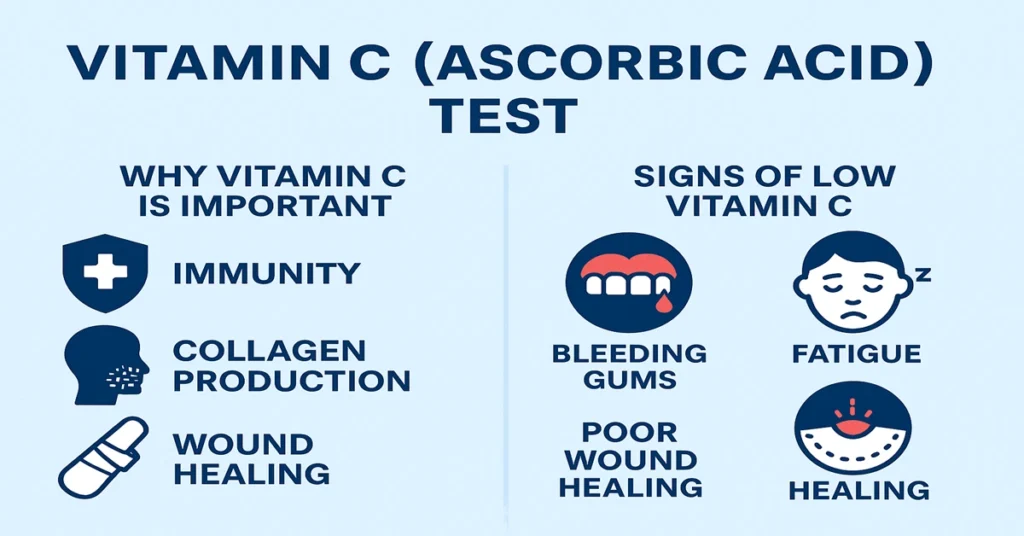What is Vitamin C (Ascorbic Acid)?
Vitamin C, also known as Ascorbic Acid, is a water-soluble vitamin and a powerful antioxidant that protects cells from damage caused by free radicals.
It is essential for collagen production, wound healing, immune defense, and iron absorption.
Unlike many animals, humans cannot make Vitamin C naturally because the body lacks an enzyme called L-gulonolactone oxidase.
Therefore, Vitamin C must be obtained through dietary sources, especially fruits and vegetables such as oranges, lemons, amla, guava, kiwi, strawberries, and bell peppers.
Where is Vitamin C Produced in the Body?
- The human body does not produce Vitamin C on its own.
- It must be obtained through diet or supplements.
- Some animals can synthesize Vitamin C, but humans lack the enzyme required for this process.
- The small amount of Vitamin C that circulates in the body comes entirely from the diet, mainly absorbed in the small intestine.
Main Functions and Importance of Vitamin C
Vitamin C plays multiple crucial roles in maintaining health and protecting the body from oxidative stress:
1. Antioxidant Protection
Vitamin C acts as a powerful antioxidant, neutralizing harmful free radicals that can damage cells and tissues.
It supports the body’s natural defense system and helps slow down aging-related cell damage.
2. Collagen Synthesis
It is essential for the production of collagen, a structural protein found in skin, blood vessels, tendons, cartilage, and bones.
Without enough Vitamin C, collagen formation weakens, leading to skin problems and delayed wound healing.
3. Immune System Support
Vitamin C enhances the activity of white blood cells (WBCs) — the body’s defense army.
It increases their ability to fight infections and supports the overall immune response.
4. Iron Absorption
It helps the body absorb non-heme iron (the type found in plant-based foods), preventing iron deficiency anemia.
5. Brain Health
Vitamin C supports the synthesis of important brain chemicals such as dopamine and norepinephrine, improving mood and cognitive performance.
6. Heart and Blood Vessel Health
It helps maintain healthy blood vessels by reducing oxidative stress and inflammation, contributing to better cardiovascular health.
Causes of Low Vitamin C Levels (Deficiency Causes)
Vitamin C deficiency develops when the diet lacks sufficient fruits and vegetables or when absorption is impaired.
Common causes include:
- Poor dietary intake (especially low fruit and vegetable consumption)
- Alcoholism and poor nutrition
- Smoking, which increases oxidative stress and Vitamin C requirement
- Chronic illnesses such as kidney disease or cancer
- Malabsorption disorders, such as Crohn’s disease or Celiac disease
People with high stress levels or chronic infections may also have increased Vitamin C needs.
Symptoms of Vitamin C Deficiency
Severe deficiency of Vitamin C causes Scurvy, a historical disease linked to poor nutrition, but mild deficiency is still common today.
Typical signs and symptoms include:
- Fatigue and weakness
- Swollen or bleeding gums, loose teeth, or tooth loss
- Easy bruising
- Slow wound healing
- Dry, rough, or scaly skin
- Tiny red spots under the skin (petechiae)
- Joint pain and swelling
- Anemia (due to reduced iron absorption)
- Mood changes, depression, or irritability
In children, deficiency may cause poor bone development and growth delays.
Causes of High Vitamin C Levels
Vitamin C toxicity is rare because it is water-soluble and excess is excreted in urine.
However, excessive intake through supplements can lead to temporarily high blood levels.
Causes include:
- Over-supplementation (>2000 mg/day)
- Incorrect dosage from multivitamin tablets
- Use of high-dose Vitamin C infusions or injections
Symptoms of High Vitamin C (Toxicity)
Very high doses of Vitamin C (usually >2000 mg/day) may cause:
- Diarrhea and stomach cramps
- Nausea or vomiting
- Formation of kidney stones (due to increased oxalate production)
- Iron overload in individuals with hemochromatosis (a condition causing excess iron storage)
Usually, stopping supplements restores levels to normal without permanent harm.
Normal Range (Reference Range)
| Parameter | Normal Range |
|---|---|
| Vitamin C (Ascorbic Acid) | 0.4 – 2.0 mg/dL (23 – 114 µmol/L) |
| Deficiency | < 0.2 mg/dL |
These ranges may slightly vary depending on the laboratory.
Sample Type and Test Method
- Sample Type: Blood (plasma)
- Fasting: Fasting sample is preferred for accurate results.
- Purpose: To measure plasma ascorbic acid concentration and detect deficiency or excess.
Test Preparation
To ensure accurate results:
- Fast for 8–12 hours before the test (only water is allowed).
- Avoid taking Vitamin C supplements for at least 24 hours prior to testing.
- Avoid eating citrus fruits, juices, or fortified products before the sample is collected.
- Inform your doctor about any medications or antioxidant supplements you take.
When to Consult a Doctor
Consult your doctor if you experience:
- Persistent fatigue or weakness
- Bleeding gums, loose teeth, or frequent bruising
- Slow wound healing
- Frequent infections or weak immunity
- Skin dryness, roughness, or red patches
If deficiency is confirmed, your doctor may advise:
- Increasing dietary intake (fruits, vegetables)
- Vitamin C supplements (500–1000 mg/day as prescribed)
- Monitoring levels if chronic illness or smoking is present.
Important Word Explanations
| Word | Meaning |
|---|---|
| Ascorbic Acid | Scientific name for Vitamin C. |
| Antioxidant | Substance that protects body cells from free radical damage. |
| Collagen | A structural protein vital for skin, bone, and tissue strength. |
| Scurvy | Disease caused by severe Vitamin C deficiency, leading to gum bleeding and fatigue. |
| Petechiae | Tiny red or purple spots on skin caused by bleeding under the skin. |
| Hemochromatosis | A condition where the body stores too much iron, making excess Vitamin C risky |
~END~

